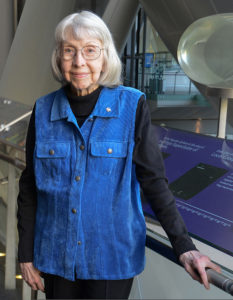In Memoriam: Janet Jeppson Asimov, 1926 – 2019

Janet Opal Jeppson Asimov died on Monday, February 25, 2019. She was ninety-two years old. Janet is remembered for her significant contributions to psychiatry, psychoanalysis, science fiction, and her dedication to humanism. AHA Executive Director Roy Speckhardt, who was in regular communication with her for years, recalled, “Janet was a whirlwind well into her eighties, racing from place to place but taking time to engage in lifelong learning, to write in her unique and compelling style, and to appreciate the arts and culture. Her direct approach, generous demeanor, and clever humor will be sorely missed.”
Janet Asimov began to reject supernatural beliefs early in life and solidified that during her university years, which began at Wellesley College. Speaking of those times, she said, “At Wellesley, I came to think of death as a disorganization of the patterns called living with nothing supernatural left over.” Janet transferred to Stanford University to complete her BA and went on to receive her MD from New York University Medical School. After completing a residency in psychiatry, she continued her education at the William Alanson White Institute of Psychoanalysis, where she accepted a job upon graduating.
She was a passionate and established writer of science fiction literature, mostly for children. Her first piece was published by The Saint Mystery Magazine in 1966, and her first novel, The Second Experiment, hit shelves in 1974. Janet had an immense talent for blending her expertise in psychoanalysis and human identity into her fiction and nonfiction. Overall she published twenty-seven works, including six novels.
On November 30, 1973, Janet married writer and professor Isaac Asimov, 1984 Humanist of the Year and the AHA’s honorary president from 1985 until his death in 1992. Janet wrote many books in association with Isaac, and after his death she picked up the writing for his syndicated popular-science column in the Los Angeles Times.
Janet had many passions. She enjoyed attending ballets and symphonies, as well as visiting the Frick Gallery in Manhattan where most of her favorite paintings were hung. Janet was also an important supporter of the arts and education, especially of science and natural history.
Janet, together with Isaac, were longtime members, supporters, and friends of the American Humanist Association. Janet greatly believed in the promotion of humanism and rational thought to move our country forward, and she invested countless hours to the advancement of the humanist worldview. On religion, she wrote, “I can respect people able to keep their minds open while enjoying whatever conventional organized religion they need—providing they don’t depend on their religious organizations to do their thinking for them.”
Over the years Janet contributed her expertise to the Humanist magazine, TheHumanist.com, and Humanist Network News. She was an advocate for uniting humanists, raising humanist children, the AHA’s promotion of reason and scientific integrity, and population control. Janet’s generosity and contributions to the AHA and the greater nontheist movement over the years have made a lasting impact on humanism, and she will be missed dearly.
